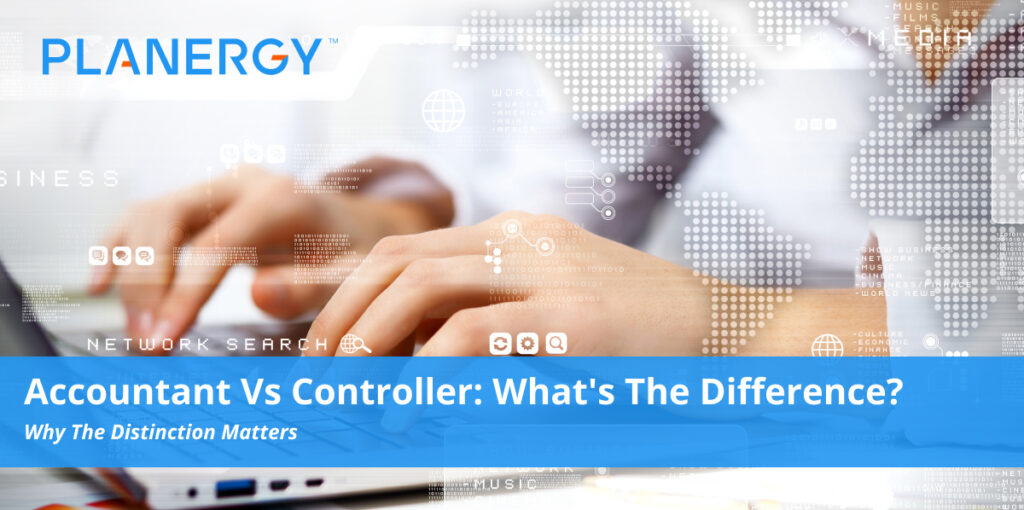When it comes to the world of finance, most people are aware of what an accountant does and the role they play within an organization.
However, when it comes to a financial controller (sometimes spelled comptroller), people aren’t so clear. The main difference is that accountants often become controllers.
An accountant, or someone who handles accounting related tasks for a company, keeps and analyzes financial data. The controller oversees the accounting operations as a whole, including managing staff.
Controllers are usually part of an accounting firm, but may also be hired in-house for larger companies.
If you start your career path as an accountant but want to move into more of a financial management position, then moving into a Controller role is a good option for you.
Accountants
Accountants have a variety of specialties to choose from. Some opt for tax accounting and some go into auditing.
Others choose to work for the government, and still, others handle cost accounting and internal reports. Specialties include:
- Forensic accountant
- Public accounting
- Management accountant
- Project accountant
- Investment accountant
- Staff accountant
- Social accountant (Corporate Social Responsibility Reporting and Sustainability Accountant)
Accountants of all types can serve as bookkeepers, and if they do not, they will at least analyze the work of other bookkeeping professionals. They work to maintain accurate financial records for coworkers, creditors, investors, and industry regulators.
Though not necessary, many choose to become Certified Public Accountants (CPAs) who are held to a strict code of ethics, not unlike those in healthcare.
Forensic accountants who work for the FBI even go through firearms training, so they aren’t your run-of-the-mill number crunchers.
Controllers
Controllers are usually either business controllers or corporate controllers. They handle entire accounting systems for their employers.
In smaller organizations, this translates to creating the accounting infrastructure and taking care of bookkeeping, where in larger companies the controllers are overseers.
Other controllers opt to work for the government and serve more like a chief financial officer (CFO) for their respective agencies.
One of the most common and underappreciated responsibilities of a controller is interpreting financial data.
Controllers generally have a lot of accounting and business forecasting experience, particularly pertaining to tax management.
Controllers may also be asked to lend their expertise to Investments, corporate governance, creditor relationships, or other areas.
Most of the time, the controller has at least one assistant controller to help them. Assistant controllers are typically less experienced and spend more of their time in the day to day data collection, regulatory and statutory reporting along with the preparation of challenging journal entries.
Some organizations employ both a comptroller and a financial controller. In these cases, the former represents a slightly more senior-level management position with the comptroller serving as a CFO. With this organization plan, both positions generally report to the chief executive officer (CEO).
The financial controller is considered an executive role and they may even serve as the top executive in the financial department at smaller companies who don’t have a formal CFO.
At firms with the CFO, the finance controller is usually second-in-command. However, leadership roles vary significantly from one organization to the next and by state, due to laws regulating business structures.
Depending on the CFO’s responsibilities, a controller may end up handling many of the duties the CFO typically carries out. That’s because a lot of CFOs devote their time to investors and external relationships, delegating tasks to business development, financial analysis, and acquisitions to the financial controller. At that point, the financial controller becomes an unofficial financial operations officer.
Differences in Education and Skills
The majority of accountants study accounting and receive a degree in that field.
It is, however, possible to become an entry-level accountant with a bachelor’s degree in mathematics, statistics, finance, or economics, but employers prefer someone with a deeper understanding of the generally accepted accounting principles.
That’s why most opt for an accounting degree and then move forward to various certifications.
Senior-level accounting positions require a CPA designation and possibly certification as a management accountant (CMA), chartered financial analyst, or other professional designation.
Senior financial accounting and Reporting jobs may need 3 to 6 years of work experience but tax accountants and Junior auditors can often get by with one to three years of experience after passing the CPA exam.
You don’t need years of direct accounting experience to become a controller but it certainly helps. Controllers, particularly for larger companies have a wider focus than simple accounting protocol.
Many have a Master’s in Business Administration (MBA) or another advanced degree in finance. The most helpful designation for aspiring controllers is the CMA.
Both accountants and financial controllers need:
- An affinity for math and solid analytical skills
- An understanding of accounting standards and regulations, including balance sheets, income statements, and other financial reports
- The ability to read and understand general ledgers
- Knowledge and experience with budgeting and forecasting
- The ability to see how all of the elements tie into a company’s overall goals
- Solid technical skills
- Data entry skills
Controllers also need leadership skills because they must be able to lead teams if they want to be effective. Controllers need to be able to step out of the detail and develop and Coach people strategically.
A company with a great financial controller can motivate staff and teams and organize them to develop useful working relationships with people across multiple departments, not just the accounting department.
Differences in Salary
It’s difficult to determine the average salary for a mid or upper-level accountant. However, most career accountants earn more than $60,000 per year within three to five years of earning their CPA designation.
The U.S. Bureau of Labor Statistics (BLS) reports the median annual wage for accountants and auditors in 201, was $34.40 per hour or $71,550.
Some positions, like internal audit managers or tax managers, may earn as much as $100,000 annually. Many accountants aim to be partners at accounting firms where they can earn well over $100,000 a year.
Financial managers, which include controllers, earn a median annual salary of $129,890 according to BLS information. In certain industries, the term comptroller means it’s an even more senior position, which of course commands an even higher salary.
Differences in Work/Life Balance
The majority of accountants work a standard 40 to 45-hour workweek with paid holidays, leave, vacation time, and even some scheduling flexibility.
Though it has a reputation for being a “boring” career, accounting remains one of the most satisfying careers according to industry reports.
That said, accountants do work long and intense hours during tax season (generally from February to April) before taking time offer for the Spring and Summer. During tax season, accountants may work more than 10 hours a day, 6 days a week.
An analysis of controller jobs from 2013 to 2015 estimated that controllers work about 43 hours a week or 170 hours a month. As such, they tend to have a much better work/life balance than others in the financial industry.
Whether you work part-time or full-time, for a non-profit organization or a major corporation, as an accountant or a controller, you’ll play an important role in decision making for your employer.




